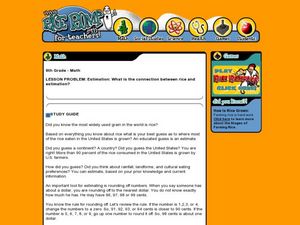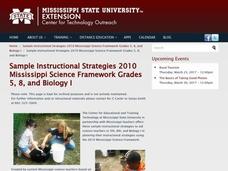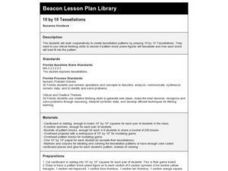Curated OER
U.S. States: The Western States
In this addition worksheet, students solve 11 addition math problems found in the western states of the United States of America. Students follow the key and color code each state by its sums.
Curated OER
U.S. States - The Midwest States
In this geography and math worksheet, students complete the simple addition equations and match the sums to the colors. Students then color the Midwest States by the color code.
PBS
The Lowdown — Examining California's Prison System: Real-World Ratio
Free yourself from the shackles of traditional math lessons. Young mathematicians investigate race, gender, and age differences in California's prison system. They use provided graphics to compare the prison population with the state's...
Curated OER
What is the connection between rice and estimation?
Sixth graders investigate estimating. In this estimating instructional activity, 6th graders estimate how much rice is eaten around the world. Students estimate the percentages of rice eaten by other countries. Students compare rice...
Curated OER
North vs. South
Students use information about the Union and Confederate troops to create a bar graph. For this graphing lesson, students graph troop information on a bar graph, color coding the information. Students then find the...
Curated OER
Part-Part-Whole
In this math worksheet, students color pictures to show that a whole number is a combination of two smaller parts. Students listen as their buddy demonstrates telling about the pictures, example: "I see one blue balloon and three red...
Curated OER
Calendar Creations About The Civil War
Eighth graders research Civil War events occurring during one month of the year, recording specific events and the dates on which they occurred. They list each event by month, day, and year on a one-month calendar of their own creation.
Curated OER
Math: Where Do I Put the Elephant?
Students listen to the story, "Harriet Goes to the Circus," to launch into a lesson on positional words, such as over, under, and behind. After clipping out and coloring pictures of circus animals, students place them into a parade line...
Curated OER
Coal Production in the USA
Students arrange the states by alphabetical order, find the five top coal producing states and discover their total production levels. They then find all the states which begin with the letter "A" and whose coal production is less than...
Curated OER
Technology: Programming Graphics
Students use the DrScheme program to create graphics for clip art. Using graphics, they plan their designs using basic shapes, plotting its positions, and studying the relationships between points. By plotting the necessary data on...
Curated OER
Calendar Creations About the Civil War
Eighth graders research key events in the Civil War and create a calendar with illustrations and key events listed throughout the year.
Mathematics Vision Project
Geometric Figures
Logical thinking is at the forefront of this jam-packed lesson, with young mathematicians not only investigating geometric concepts but also how they "know what they know". Through each activity and worksheet, learners wrestle with...
Differentiation Central
Perimeter and Area
Leave no student behind with this differentiated geometry unit on perimeter and area. Over the course of five lessons, young mathematicians explore these foundational concepts through a series of self-selected hands-on activities and...
Curated OER
Geometry Project
Proofs are usually an intimidating assignment. An engaging lesson focused on geometric proofs may reduce the anxiety! Pupils choose between several triangle proofs to complete and work on completing them. The...
EngageNY
From Ratio Tables to Equations Using the Value of a Ratio
Use the value of a ratio to set up equations. The teacher leads a discussion on determining equations from ratio tables in the 13th portion of a 29-part series. Pupils determine which of two equations to use to find the solution....
Curated OER
10 by 10 Tessellations
Fifth graders, with a partner, create tessellation patterns by playing 10 by 10 Tessellations. They need to use critical thinking skills to decide if pattern block plane figures tessellate and how each block best fits into the pattern.















